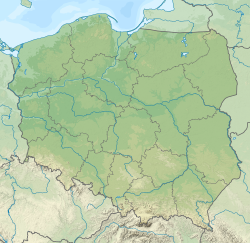The Zagaje Formation is an Early Jurassic Epoch (Hettangian-Sinemurian) geologic formation located mostly in Poland with layers also exposed in north Germany. This unit is known for its diverse Ichnofossil assemblages, with traces of invertebrates along vertebrate footprints. Indeterminate fossil ornithischian tracks, of the Hettangian Stage, have been reported from the formation.[4] The Zagaje Formation correlates with The lower part of the Höganäs Formation in Scania, as well the Munkerup Member and the Gassum Formation in Denmark.[1]
| Zagaje Formation | |
|---|---|
| Stratigraphic range: Lower Hettangian-Lower Sinemurian~[1] | |
 Exposed Layers at Sołtyków | |
| Type | Geological formation |
| Unit of | Kamienna Group |
| Sub-units | Huta Mudstone Member |
| Underlies | |
| Overlies | Unnamed Rhaetian Beds |
| Area | Polish epicontinental basin except of the Mazury region and Czêstochowa region. Reaches also into north Germany |
| Thickness | 157.5 m |
| Lithology | |
| Primary | Sandstone |
| Other | Mudstone |
| Location | |
| Coordinates | 51°06′N 20°30′E / 51.1°N 20.5°E |
| Approximate paleocoordinates | 43°06′N 18°48′E / 43.1°N 18.8°E |
| Region | Swietokrzyskie |
| Country | |
| Type section | |
| Named for | The Town of Zagaje near Gromadzice |
| Named by | Karaszewski (as an informal unit)[3] |
See also
editReferences
edit- ^ a b Pieñkowski, G. (2004). "The epicontinental Lower Jurassic of Poland". Polish Geological Institute Special Papers. 12 (1): 1–154. S2CID 128922070.
- ^ Deutsche Stratigraphische Kommission (2016). "Stratigraphische Tabelle von Deutschland" (PDF). GeoForschungsZentrum. 1 (1): 1. Retrieved 22 December 2021.
- ^ Karaszewski, W. (1962). "The stratigraphy of the Lias in the Northern Mesozoic Zone surrounding the Święty Krzyż Mountains (Central Poland) [Eng. Sum.]". Pr. Inst. Geol. 30 (3): 333–416.
- ^ Weishampel, et al. (2004). "Dinosaur distribution." Pp. 517-607.
Bibliography
edit- Weishampel, David B.; Dodson, Peter; Osmólska, Halszka (2004), The Dinosauria, 2nd edition, Berkeley: University of California Press, pp. 1–880, ISBN 0-520-24209-2, retrieved 2019-02-21
